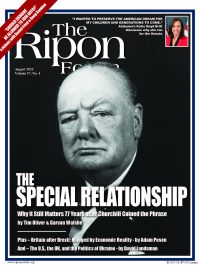
According to Ukrainian President Volodymyr Zelensky, NATO’s Vilnius summit was a bust. He trashed his hosts, saying: “It’s unprecedented and absurd when time frame is not set neither for the invitation nor for Ukraine’s membership.”
Zelensky believes that Americans have an obligation to die for his country. Indeed, last November he attempted to lie NATO into the war, claiming that a Ukrainian missile which hit Poland was Russian. Washington and Warsaw knew the truth, so surely Zelensky did as well.
That he would do most anything to drag Washington into the conflict is unsurprising. But this should remind Washington that alliances are serious. They exist to safeguard security, not provide charity. The promise to go to war should be reserved for the most important interests — ones that are vital, even existential.
Ukraine is not one.
The promise to go to war should be reserved for the most important interests — ones that are vital, even existential. Ukraine is not one.
The U.S. went to war twice for Western Europe in the 20th century. After the second time, Washington established NATO. However, its writ was limited, preventing Soviet domination of Western Europe, and temporary, providing a defense shield behind which allied states could recover.
According to historian James McAllister, “American policymakers from Franklin Delano Roosevelt to Dwight Eisenhower strenuously tried to avoid having the future of Europe dependent on a permanent U.S. military presence on the continent.” President Dwight D. Eisenhower was even blunter: “We cannot be a modern Rome guarding the far frontiers with our legions if for no other reason than that these are not, politically, our frontiers.”
Ukraine’s situation is awful, but the world is filled with tragedy. Millions of people died in the Democratic Republic of Congo a couple decades ago, with nary a mention in Washington. Young Americans have no obligation to sacrifice their lives in endless foreign crusades.
The reason Kyiv is not in NATO now is because neither the U.S. nor the Europeans believed that Ukraine warranted war with a nuclear power. For centuries it was an imperial territory, first in the Russian Empire and second in the Soviet Union. NATO issued its welcoming statement to Kyiv in 2008 only under pressure from the George W. Bush administration. Then both Washington and Brussels spent 14 years lying to Ukraine, professing support for the latter’s accession while blocking its entry. When Russia invaded, the allies similarly refused to back Ukraine with military force.
Even European endorsement for Kyiv’s inclusion — the Baltic states and Poland are supportive, while Germany and other members are opposed — should not matter in Washington. In any hot war with Russia the U.S. would do most of the fighting and take most of the risk. European officials privately admit that their populations are tired of even funding Ukraine’s military. Worse, a 2020 Pew Research Center survey of 16 European countries found respondents 50 to 38 percent against defending their neighbors. Yet most Europeans naturally expected that the U.S. cavalry would ride to their rescue in a crisis.
In short, the likelihood of European states loosing vast legions of soldiers, fleets of tanks, and flights of planes, even if such forces existed, against Russia over Ukraine is minuscule. They expect America to defend them. Kyiv wants to join NATO to be protected by America.
The reason Kyiv is not in NATO now is because neither the U.S. nor the Europeans believed that Ukraine warranted war with a nuclear power.
Of course, Ukrainian officials deploy the full range of emotional rhetoric about fighting for Europe and democracy, but such claims are not serious. Even Vladimir Putin has never shown any interest in conquering Europe, evidently a hopeless quest after his bungled Ukraine venture. Washington cares about democracy except when it doesn’t, like when it underwrote Saudi Arabia’s vicious military campaign against Yemen, which killed more civilians there than Russia has in Ukraine.
Although Moscow’s invasion was unjustified and criminal, the allied commitment to expand NATO to Ukraine put the latter in the crosshairs of Putin, along with most of Russia’s ruling elite. Of course, allied officials vigorously resist any accountability for their reckless behavior toward Moscow. Yet American and European policymakers would have reacted hysterically and violently to similar behavior by Russia (or China) in the Western Hemisphere —e.g., expanding the Warsaw Pact northward through Central America, promoting the ouster of a pro-American president of Mexico, and inviting the new government to join the hostile military alliance. The Cuban Missile Crisis demonstrated what Washington really believes about spheres of influence.
Unfortunately, Ukraine suffers in a bad neighborhood. But that is no justification for putting Americans and America at risk. Going to war is serious business. The U.S. should do so only because it must, not because it can. Ukraine is not such a cause.
Doug Bandow is a Senior Fellow at the Cato Institute. A former Special Assistant to President Ronald Reagan, he is author of Foreign Follies: America’s New Global Empire.




